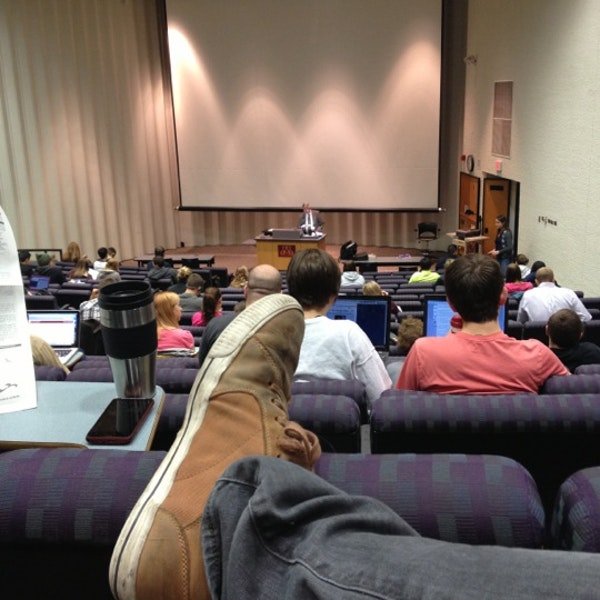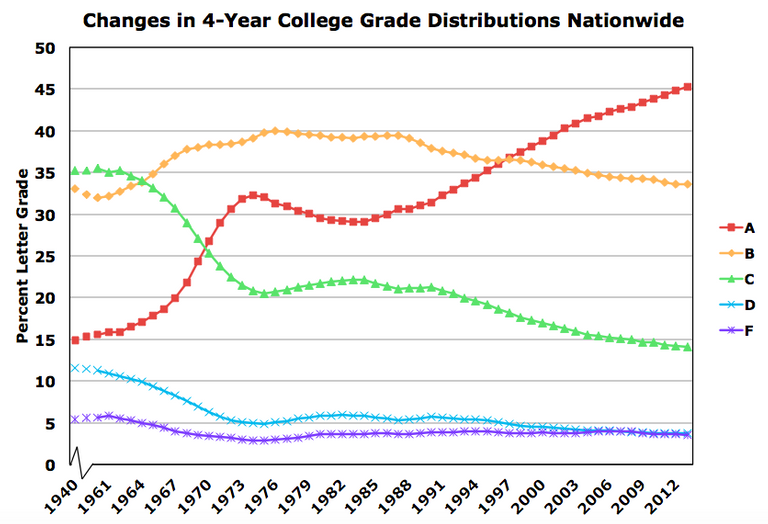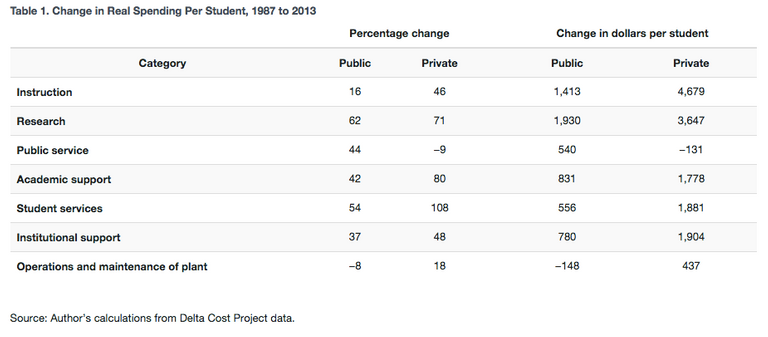Welcome to the third installment of my series detailing the issues plaguing private higher education. This chapter will focus on retention, attrition, and the financial consequences thereof. If you're wondering where the hell I get off discussing this, or want to know more about the subject, feel free to check out my other posts:
There are three crucial figures that colleges and universities obsess over: first-time freshmen; retention; graduation rate. All of these go hand-in-hand and the federal government asserts an incredible amount of pressure when it comes to these numbers, but you'll learn more about that in Chapter 5. Ultimately, it boils down to butts in seats. Get them there, keep them there, and then make sure they leave within 4-6 years. Chapter 2 focused on getting them there and keeping them through week 3, which is the industry standard for when institutions pull their data. At this point, students are far less likely to drop out during the rest of the semester and so at week 3, a first-time freshman transitions into retention. In other words, those who counted towards freshmen enrollment will then be tracked into their sophomore year to determine an institution's retention rate*.

Where recruiters in admissions departments have sales quotas to meet, once on campus, it becomes everyone's job to retain students. This permeates throughout every division of a college. Institutional Advancement sets fundraising goals in order to alleviate some of the financial burden placed on Pell-Grant eligible, i.e., economically struggling students†. Financial Aid or Career Services will hold workshops that focus on student loan education and financial literacy. The list goes on, but two divisions play the greatest role in student retention: Academic Affairs and Student Affairs. If you look at any institution, these two divisions are responsible for the vast majority of costs (athletic departments may be an exception). However, there are political and ethical ramifications to this.
Historically, academic affairs paid no heed to retention. In fact, the sentiment leaned more towards a lack of sympathy and an expectation for students to prove themselves. This is still true at many - often more prestigious - institutions; however, the administration at most colleges and universities have placed retention expectations on faculty. This has been very contentious as faculty typically hold their positions for reasons that don't include teaching. Perhaps they are cancer researchers, famous artists, or working on their sixth book. They don't become faculty to teach, but to have access to fellow great minds and funding; teaching is often something they have to do. There are exceptions to this; I know countless faculty who do it solely for the rewards of teaching a group of students, mentoring those who are struggling, and watching them excel throughout their 4-6 years, and these faculty are the most admirable. But for the rest of them, retention is a new burden that detracts from their professional practice (the primary reason they were hired) and their ability to participate in faculty governance.
This burden can take different forms. For some, it's self inflicted, indicative of a dedicated faculty body that genuinely wants to see students and the institution succeed. They'll do anything they can, including being on call 24/7, taking them on weeklong field trips, giving weak feedback, excusing excessive absences, etc. Ultimately, students abuse the faculty's generosity and the faculty member burns out. Plus, students don't learn the value of meeting deadlines or taking constructive criticism. This pressure can also be top-down. Imagine you're a faculty member who's a tough but fair grader. One day, you get an email from your department chair or even the school dean, inquiring as to why you have such a high percentage of students getting D's or F's. In your mind, they didn't demonstrate that they learned the material and/or didn't complete the work and/or didn't show up and their grades should reflect that. But what would you do if the person who signs your checks, approves your research funding, and ultimately decides whether or not you get tenure starts asking questions about tough grading? Most give in, resulting in grade inflation. The following images (c/o http://www.gradeinflation.com/) capture this across public and private institutions:
Five-Year Grade Point Averages from 1983-2013 by Institution Type

Average Number of A's Awarded since 1963

Note the increase coincides with events outlined in my historical summary of academic dysfunction
Grade Distributions at 4-Year Institutions since 1940

Note: these datasets do not include community colleges
value of their degree(s) is diminished.These inflation rates do not coincide with improved performance at the K-12 level (http://www.gradeinflation.com/ details this and shares its research methods), meaning that students are not performing better and as a consequence, more students are receiving degrees without performing to the expectations of yesteryear. They're not getting what they paid for and subsequently the
In addition to the ethical ramifications of grade inflation, Student Affairs divisions are guilty of providing a gluttony of services the are directly responsible for skyrocketing tuition rates**.

https://www.clevelandfed.org/newsroom-and-events/publications/economic-commentary/2016-economic-commentaries/ec-201610-trends-in-expenditures-by-us-colleges-and-universities.aspx
As outlined previously, this is due on part to institutions competing with one another, but it is also due to students expecting more. Students enter college demanding better dorms, food, tutors and hours, student clubs, labs, dances, wifi, stadiums, etc., etc., etc. A firehose of services has been opened and yet somehow students are still thirsty. They don't stop to think about the fact that their engorged student loans or thinned parental wallets is what pays for it. They pay more, so they want more, so they pay more and before you know it, you have a perpetual motion of tuition increases and services until at some point the whole thing breaks.
And that is where we are right now in American higher education. Schools, GOOD schools are closing their doors because not enough people can pay for the tuition necessary for them to compete with bigger, more well-endowed institutions. As a result, there will be fewer options for students, putting institutions in the position of being able to cherry pick who does - and doesn't - get to enter into their ivory towers. There are some institutions that should close, but not the majority of them. Education is not a game of survival of the fittest; access is key and the fewer institutions there are, the more people won't be able to attend.
*Retention is tracked for every year: freshman to sophomore; sophomore to junior; junior to senior. The Federal Government emphasizes freshmen-to-sophomore retention as a measure of an institution's recruitment tactics. If retention is low, chances are they have some questionable recruitment and enrollment practices. If it's high, it means they recruited a "healthy" student body population that has a great chance of matriculating, i.e., graduating through a traditional academic plan.
†It is taboo to say poor, broke, inner-city youth, or anything of the like at these places. Instead, people refer to students from lower socio-economic status as "Pell-Grant eligible," which is a Federal grant awarded only to students whose FAFSA demonstrates a level of need. Truly savvy academicians will refer to these students as "SES." While technically more accurate, it's still an politically correct way of skirting the whole more-poor-people-happen-to-be-minorities issue.
**For the purposes of this series, Student Affairs should include all student support services, both academic and ancillary (health and wellness, counseling, learning support services, etc.). The dividing lines between Student and Academic Affairs varying between institutions and while there are commonalities (e.g., the library is almost always in Academic Affairs), my point is more on the student services than on which division is hosts which services.
The more light shined on the disastrous, consumerist higher education racket, the better.
The incentives are unfortunately perverse, and the pile of student loans building up is not dissimilar to the tranches of mortgages in the 2000's: there's no real market discovery of price/risk, so the taxpayer will end up paying way too much money one way or another.
What was your motivation for this series? Eager to read the others.
After more than half a decade working in the industry, I've reached a point of disgust and disappointment where I feel it necessary to share what I've learned. There's a LOT of vitriol around this topic and while it's warranted, it's oftentimes misplaced. I'll expand more on this in my next few chapters, which will focus on student loans, the role of the federal government in creating this mess, and what people can do about it.
I'm glad you're enjoying it! If you have any questions or issues you'd like me to discuss in greater depth, please speak up and let me know. I'm happy to share my insights on the subject.
I understand the disgust, and hope you can use your insight to make a positive impact. Higher ed is important!
Education system will never be enough, it's value is slowly but surely deteriorating.
I can't find the link to it, but I do remember reading an interesting survey about the functions of universities as perceived by university workers in Japan. Funny enough, the number one function was to provide students with jobs. You see, all universities here have direct connections with companies that recruit young people when they become 3d or 4th year students (and recently due to the population drop, as early as 2nd year). Often, universities' popularity is directly proportional to the strength and breadth of their connections to big and small companies.
This is likely the future of education in the US, with colleges and universities providing more of the "soft skills" that they've all but stopped learning from their parents and in K-12. However, only those with the clout, money, and established connections will be able to provide that to prospective students. Quality institutions that aren't as well positioned will close and that's where the access issue comes in.
Philosophically, my issue with this goes back to my first post on the subject; education should be about knowledge for knowledge sake and not about getting a job in the field in which you study. Statistically speaking, I would count against my alma mater because I don't technically work in anthropology, even though I use it every day and fit many people's definitions of success.
True. Given that universities fail to eqiup students with the practical skills and sometimes even relevant theoretical skills for the workplace, it wouldn't hurt for them to orient themselves towards research. Right now, I think universities have an identity crisis (have I mentioned that before?) - they are terrible educational institutions and, at least most of them, produce sub-par research.
I believe, the citation rate for academic articles is less than 5% these days, meaning 95% of research remains unnoticed (often rightfully, considering its significance and quality).
Your post about this was good. What a waste of money, time, and resources!
Oh yeah... I am not proud of it, but I try not to think about it and just focus on doing my thing with as many people as I can get onboard. Who knows, we might make a difference in the future.
Touché, I shouldn't generalize like that. Wanting to make a difference is key. More researchers avoiding intellectual masturbation would really help things.
This resonates with my experience at one of the most expensive universities in the U.S. -- University of Richmond. While they use their money (2.19 billion dollar endowment!) to attract great professors and build/market their country club of a campus, it's clear that the student body is nothing but a cash crop to them. I am interested in the ways in which universities manufacture consent on their campuses -- how they give students a perceived sense of agency through trivial clubs and "perks," while bigger decisions are made by the Trustees. Then, there's the whole "Greek system" which is essentially a psy op used by the administration to implement fictitious divides within the student body through the pretense of tradition -- when I was at the University of Richmond, roughly 50% of the students were part of fraternities and sororities -- we are talking about a campus of 3,000 students. There's also a wide variety of clubs to further segment the population, but no Student Union for obvious reasons. The "Student Government" was a joke and was controlled by the administration. Now that I think about it, a lot of the tricks used by universities to control the population are true for society at large -- social control, censorship, complete disregard for feedback. This is what happens when you let neoliberals control education, not to mention that colleges are a great honey pot for military propaganda and recruitment. UR is recognized for its Business School which is essentially an assembly line to Wall St.
What "saved" it for me was finding a group of fellow weirdos and creatives who became my best friends. If it weren't for them, I'd be in great trouble. This is the opportunity which a lot of universities fail to capitalize on -- the generative power of their student body, and why would they, if that would threaten the status quo imposed by the Board of Trustees and whoever else is pulling the strings?
Student debt is perhaps the biggest, and most obvious, scam of our generation. Now that it has even surpassed credit card debt, there's no denying that student debt is just a way to pacify us -- to keep us docile and chained to the system, because when we are thousands of dollars in debt we are not going to rebel much at work. I was lucky to qualify for FAFSA and my debt after graduation was below 20K, but I know a lot of people who will be paying off their debt for a while.
Nice to read your in-depth take on the issue. I think you might enjoy this video:
Interesting video, though fairly hyperbolic. NCLB was an incredible failure, and one that took far too long to fix (I count myself lucky that I finished high school before it passed). There is so much variation across school districts and states that to say it's essentially like training cattle gives no credit to the good teachers, good curriculum, and good administrators that are out there.
informative contents share. keep sharing.
Thanks!
This comment has received a sweet gift of Dank Amps in the flavor of 3.29 % upvote from @lovejuice thanks to: @qasimwaqar. Vote for Aggroed!
Those charts you show are fascinating! I don't doubt the grade inflation in private schools. I wouldn't have expected it in public schools as well. I got my bachelors degree from a private school and what a waste of money it was. Academics were terrible and the only motivation of the school was to get as much money from me as possible. Even getting transcripts have an excessive profit motive. But I also saw problems in my public school I went to for my associates degree. Some of the professors had been there so long and were just collecting a paycheck.
Most of the issues are systemic, which is why the problems are so hard to fix.
the education system is occupied by some greedy peoples. the private H.E mafia controlled the whole education system all over the world.everyone is targeting to students government private schools, universities, colleges, banks and treating as a profit center.
Great post!
Thanks!
I saw so much weak grading, excusing excessive absences, and overall mercy-passing of students at Kettering. Felt like the degree was getting diluted just to shepherd people through to graduation.
I'm sorry to hear that you experienced this at your college. It's unfortunately all too common.
please anyone here who will like to share advice and opinion on sex education? there is a move we plan to make and we will appreciate advice, opinion and instructions. please feel free to share your view on this
https://steemit.com/sex/@outhori5ed/sex-education-by-ogunleye-dele-victor
thank you
I can't speak with any authority on this because sex education is relegated to the K-12 system. However, anecdotally, my experience is that this varies not only by state, but by individual school districts. I, for one, never had sex education despite attending a fairly progressive district. Instead, I learned about the male and female reproductive systems. Not how they're used or how to prevent infections/pregnancy. These omissions are not overtly couched in religion, but that's the root cause of it.
Yes, I agree with you. I too was taught about the reproductive system and was naive about its use at that time. But how a system deem it fit to allow the age group of between 9-11year old into something more advance is frightening. Someone shared a link with me to study and see how this is an agenda and few lines into the work and I am just speechless.
Awesome post...the details integrated into your posts are awesome I must confess
Thanks! I spend a lot of time on them and appreciate that you noticed.
Great series. I will be following closely to read the remaining chapters.
BTW, you might find this link of interest. It documents the lawsuits against the Department of Education that have just been filed:
http://www.nakedcapitalism.com/2017/07/18-states-sue-betsy-devos-reinstate-rules-protecting-students-predatory-private-colleges.html
Hi, @spurious-claims
I am writing to you about our initiative for quality writers in the fields of education and philosophy that I thought you may be interested in. Please see this announcement. I hope you can join us if our community suits you.
Hi @snakiest. Sorry I went MIA, but I'm back after relocating. If this offer still stands, I'd like to participate.
Hi. No problem. Yes, we are actively looking for members. Please check the post for the details. =)